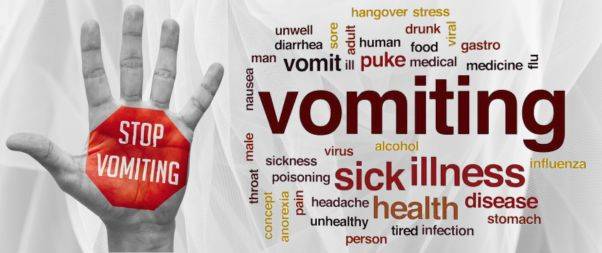Overview
Vomiting after drinking alcohol can be an unpleasant and potentially dangerous experience. It occurs when the body tries to expel the toxins present in alcohol to protect itself from further harm.
While the best way to avoid vomiting due to alcohol is to drink in moderation or not at all, sometimes the situation can get out of hand.
In this article, we’ll explore evidence-based strategies to stop vomiting after drinking alcohol, as supported by clinical research.
Why Does Drinking Alcohol Make You Vomit?

Vomiting is one of the body’s defense mechanisms against toxins, and while it may not always feel pleasant, it serves a purpose.
When you consume alcohol, your body breaks it down into acetaldehyde, a toxic byproduct. Several factors contribute to nausea and throwing up after drinking alcohol:
The body’s inability to process acetaldehyde:
When alcohol consumption is moderate, the liver neutralizes acetaldehyde using a substance called glutathione. The body processes these compounds, maintaining a normal state.
However, excessive drinking can overwhelm the liver’s capacity to produce glutathione. When this happens, the body recognizes that it cannot keep up with acetaldehyde levels and eliminates it through vomiting.
Alcohol-induced irritation of the stomach lining:
Excessive alcohol consumption can irritate the stomach lining, leading to an acid buildup that exacerbates nausea.
Risk of alcoholic gastritis:
Regular, heavy alcohol consumption can result in alcoholic gastritis, a condition characterized by frequent stomach-related issues such as ulcers, nausea, and acid reflux.
Chronic alcohol abuse also interferes with nutrient absorption and has been associated with cancer, diabetes, pancreatitis, and cirrhosis of the liver.
Alcohol poisoning:
A life-threatening condition, alcohol poisoning occurs when a person consumes so much alcohol that their body is unable to cope with the amount of alcohol in their bloodstream.
Symptoms include
- confusion
- vomiting
- seizures
- slow heart rate
- shortness of breath
- low body temperature
Alcohol poisoning also impairs a person’s gag reflex, increasing the risk of choking while throwing up.
What is the Typical Duration of Vomiting After Drinking?
Hangover symptoms generally subside within 24 hours after ceasing alcohol consumption. Consequently, nausea should also dissipate within this time frame.
Nonetheless, if an individual continues to experience nausea more than a day after drinking, it could indicate the development or worsening of a medical issue.
In such cases, it is important to consult a doctor promptly. A healthcare professional can help determine if there is an underlying cause.
Why Does Vomiting Bring Relief?

Although vomiting can be unpleasant, it serves as the body’s natural defense mechanism against harmful substances.
Excess alcohol in the body can trigger the release of emetic neurotransmitters such as dopamine, histamine, serotonin, and acetylcholine, which play a role in inducing vomiting.
These neurotransmitters prompt the diaphragm and abdominal muscles to contract forcefully, expelling toxins through the mouth until the body feels that it has successfully eliminated them.
Following an episode of vomiting, the body releases endorphins to manage stress and alleviate discomfort.
These endorphins also produce pleasurable sensations, contributing to an improved sense of well-being after throwing up.
How to Cure Nausea After Drinking Alcohol

Experiencing vomiting after drinking is your body’s way of eliminating toxins.
Rather than attempting to suppress the urge to vomit, it is advisable to focus on alleviating discomfort while your body processes the alcohol.
Here are some remedies to address hangover-related nausea and vomiting symptoms:
Hydration
One of the primary reasons for vomiting after consuming alcohol is dehydration. Alcohol is a diuretic, which means it increases urine production and can lead to dehydration.
Dehydration, in turn, can irritate the stomach lining and cause vomiting. To counteract this, drink water or electrolyte-rich beverages like sports drinks or coconut water before, during, and after consuming alcohol (Wiese et al., 2000).
Ginger
Ginger is a natural remedy that has been used for centuries to treat nausea and vomiting.
According to a systematic review of clinical trials, ginger is an effective and safe treatment for nausea and vomiting in various clinical settings, including postoperative nausea and chemotherapy-induced nausea (Ernst & Pittler, 2000).
Consuming ginger in the form of tea, capsules, or even candied ginger may help alleviate vomiting after drinking alcohol.
Antacids
Alcohol can increase the production of stomach acid, leading to irritation and vomiting.
Taking over-the-counter antacids can help neutralize excess stomach acid and reduce the likelihood of vomiting.
However, it is essential to consult with a healthcare professional before using antacids, especially if you have any underlying medical conditions (Cheung et al., 2010).
Eat Bland Foods
Consuming bland, easily digestible foods like crackers, toast, or plain rice can help absorb excess stomach acid and soothe the stomach lining.
These foods can also provide a source of energy and nutrients that may be lost due to vomiting (Borrelli et al., 2007).
Deep Breathing Techniques
Deep, controlled breathing can help calm the body and reduce the urge to vomit.
Techniques like diaphragmatic breathing or the 4-7-8 method can help relax the body and potentially alleviate vomiting (Jerath et al., 2015).
To practice the 4-7-8 method, inhale through your nose for a count of 4, hold your breath for a count of 7, and exhale through your mouth for a count of 8.
Seek Medical Assistance
If vomiting persists or becomes severe, it is crucial to seek medical help.
Excessive vomiting can lead to
- Dehydration
- Electrolyte imbalances
- Other complications that may require medical intervention.
Tip: The most effective way to minimize the impact of alcohol is to either consume it in moderation or refrain from drinking entirely.
Limiting intake to no more than 14 units of alcohol per week can help reduce associated risks. This threshold is roughly equivalent to 6 pints of beer or 10 glasses of wine.
In a Nutshell
Various factors can contribute to vomiting after alcohol consumption. While it may provide temporary relief, vomiting due to drinking can lead to significant health issues.
People should avoid intentionally inducing vomiting while or after drinking, even if they feel nauseous.
Prompt medical attention is necessary for anyone exhibiting symptoms of alcohol poisoning.
Also Read






